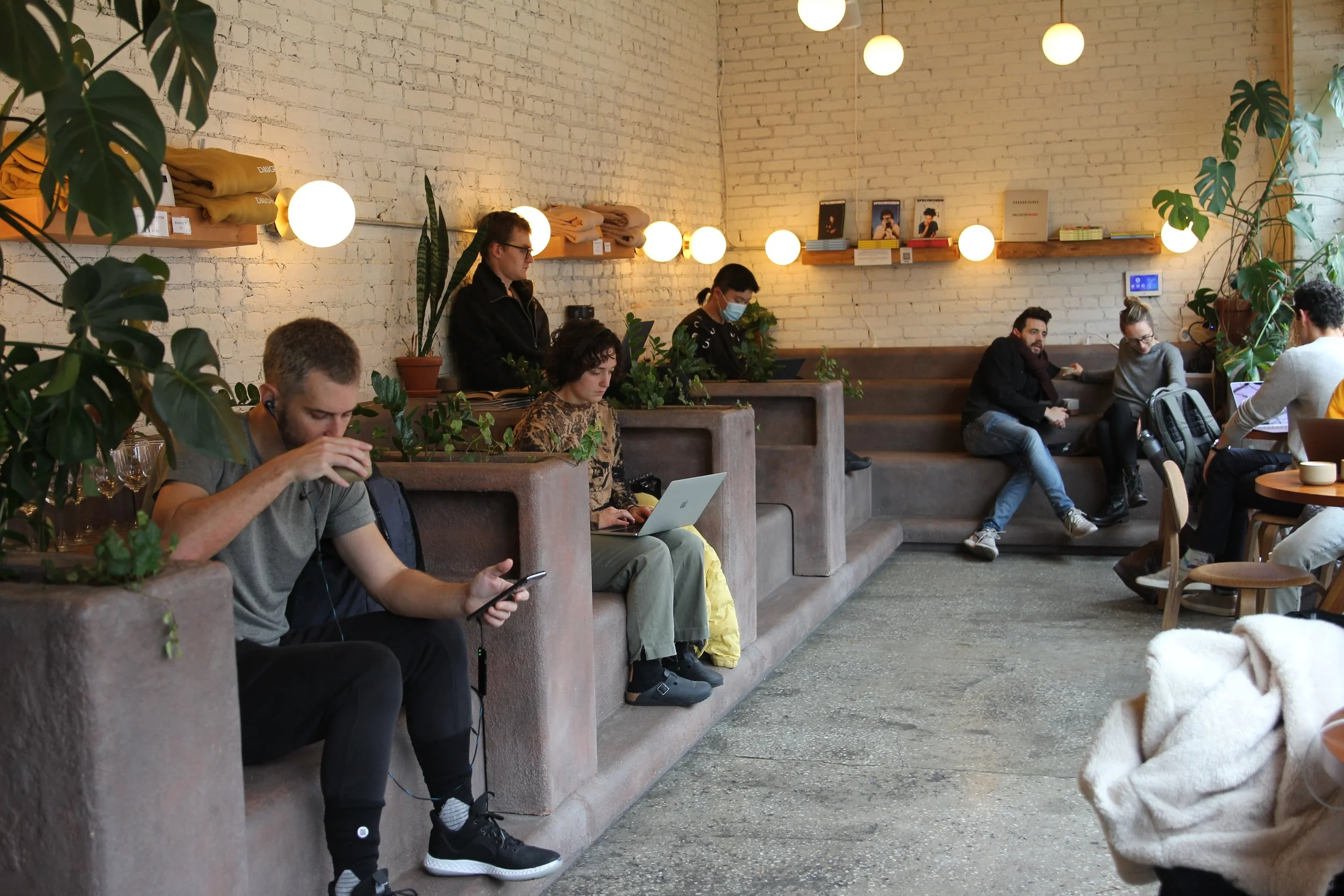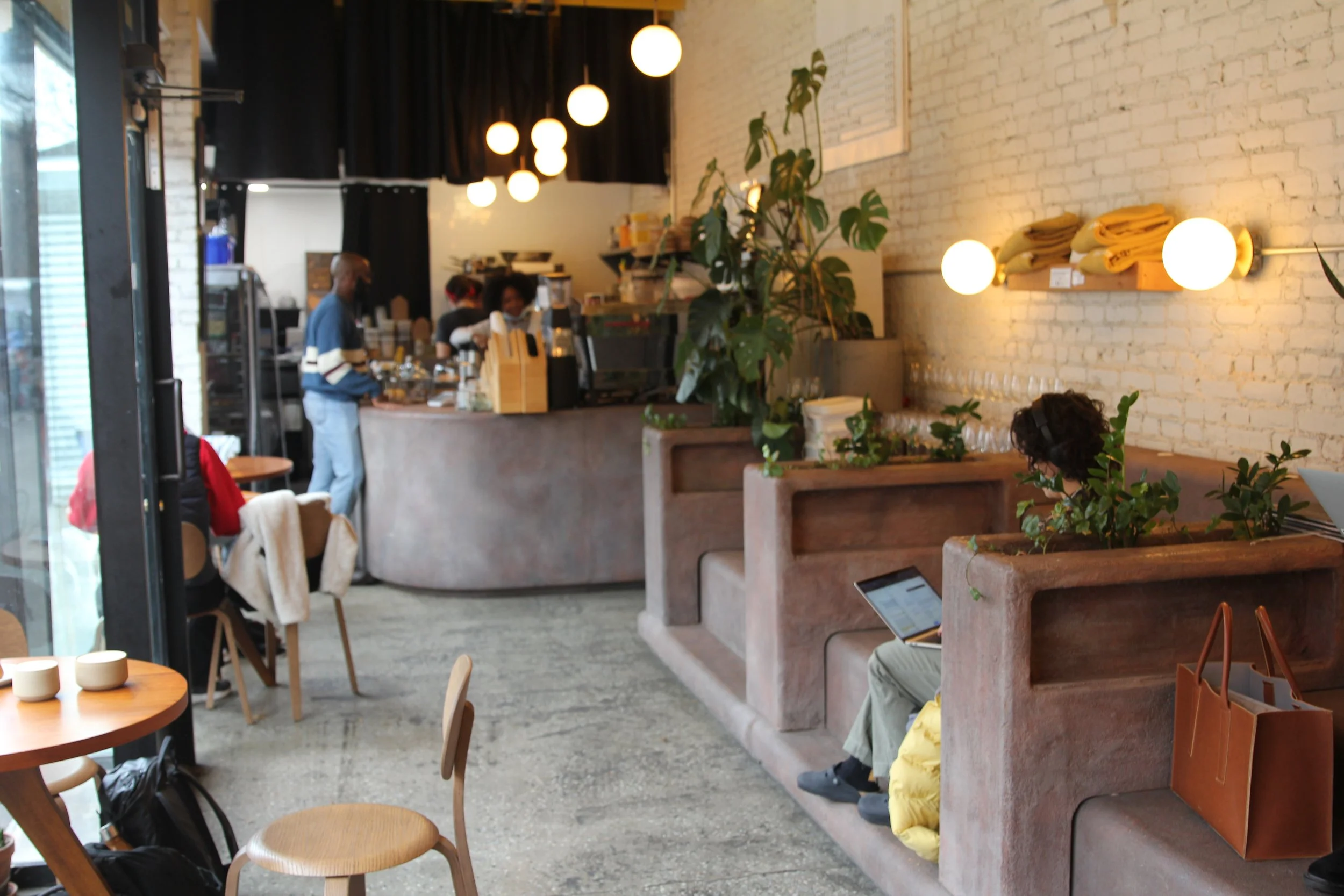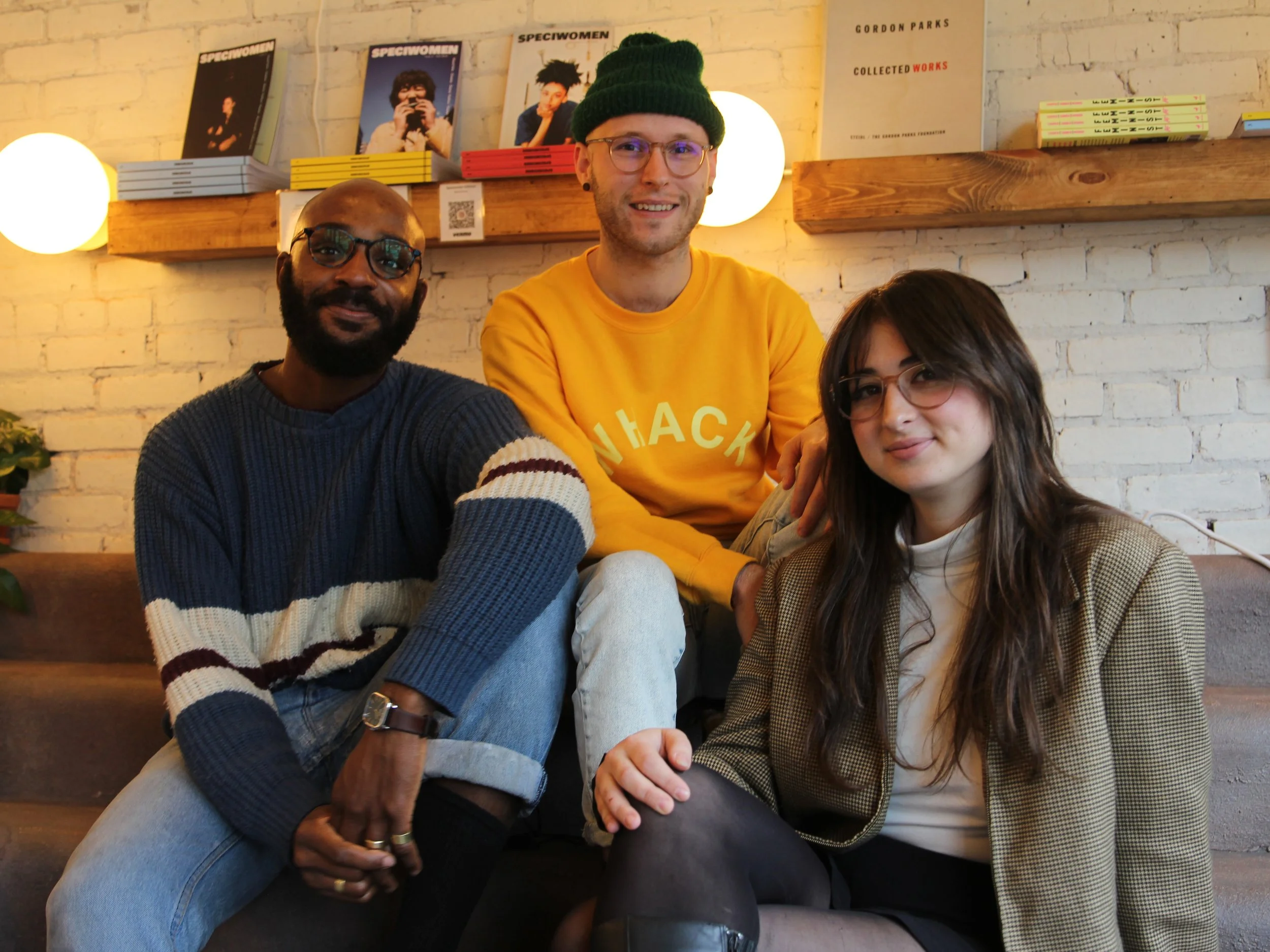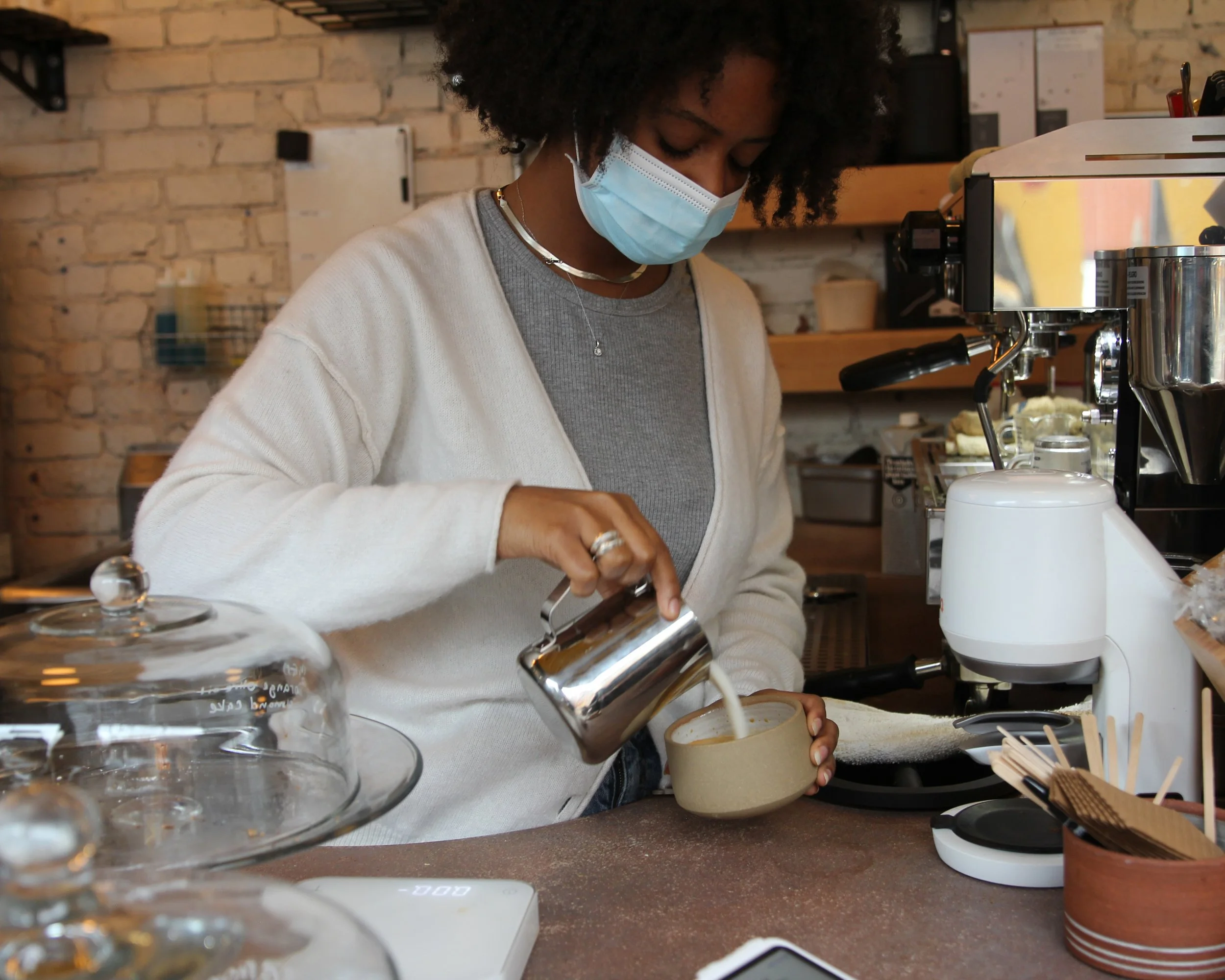
An Industry Under Construction
Can up-and-coming restaurateurs rebuild an inequitable system from within?
Except where otherwise noted editorial, photos and audio by Hannah Fullmer
Chef Telly Justice, 34, and sommelier Camille Lindsley, 28, began dreaming about opening a food business together almost immediately after they first met in 2015. The pair bonded early on over complaints about their restaurant jobs and the systematic issues within the industry they found oppressive and dehumanizing. As they endured grueling hours in male-dominated kitchens and fought for recognition by superiors who weren’t receptive to their queer and trans identities, they spitballed ideas like opening a bed and breakfast or an art gallery that doubled as a restaurant.
A complete gut renovation began in December 2021 on the location that will become HAGS. —Image courtesy of HAGS
Now that they’ve finally broken ground on their LGBTQ+-focused fine-dining restaurant HAGS, which is scheduled to open in the East Village in early 2022, the life and restaurant partners have begun to plan out the smaller details of their space.
They picture a dining room designed to elicit the tension between more dark masculine colors and elements with lighter, feminine touches like soft-edged furniture and comforting decor.
For the set menu, cooked by Justice nightly and created to focus on the diner’s experience rather than feature the chef, they hope to wink and nod at a shared trans and queer experience. As she designs the culinary offerings, Justice is ruminating on her queer food memories, like vegan potlucks or eating sardines on Jacob Riis beach and the comfort and belonging they gave her as she was coming out of the closet.
Justice and Lindsley also see their staff making a livable wage, and receiving health insurance and benefits. They also see them being able to sit, take breaks and work in spaces where superiors don’t hurl insults at them. In almost any white-collar job, the items on this list would be seen as standard, but in the restaurant industry, where benefits and breaks are rare but abuse is commonplace, these commitments to treating their future employees well are Justice and Lindsley’s most exceptional goals.
Justice has spent nearly 16 years in the restaurant industry in a variety of roles from bread baker and butcher to candy maker and head chef, but she’s spent most of her time as a line cook. When she and Lindsley were laid off from their restaurant jobs in March 2020, they finally decided to take the plunge and begin work on HAGS.
“I've had a lot of time to ruminate on what works, what didn't work—most of it doesn't work—and really daydream and put pen to paper and build a plan on what I would do differently and better,” said Justice.
Telly Justice (left) and Camille Lindsley (right)—Photo by Robert Bredvad and Mia Katz
There's really no end to how bad this industry was pre-pandemic.
-Telly Justice, HAGS co-owner
Trying Something New
Justice and Lindsley are part of a growing number of entrepreneurs (often young, frequently queer or people of color) trying to change a restaurant industry from within by opening up their own businesses. These socially conscious and ethically minded ventures have popped up across the country and are committed to creating equitable spaces, addressing toxic workplace cultures and are frequently tied to larger social issues like food insecurity, zero-waste initiatives or in the case of HAGS, queer representation. But these entrepreneurs are fighting an entrenched system and financial constraints that dictate and limit what they can make into reality.
“There's really no end to how bad this industry was pre-pandemic,” said Justice. “In any direction you want to look in, any corner of the business models and the accepted cultures that you want to investigate, you will find horrible, horrible stuff.”
The abuses Justice alludes to include grueling, unpredictable hours where rest and vacation time is discouraged and meager wages. In New York City, the tipped minimum wage is just $10 an hour. Although one of the highest minimum wages in the country, it’s still not enough by local standards. In New York City, workers are supposed to reach the full minimum wage of $15 when their tips are added to their base pay. If they don’t, their employers should make up the difference, but 35% of workers nationwide say that doesn’t happen, according to a report by One Fair Wage, a nonprofit organization that advocates for a higher tipped minimum wage for restaurant workers. Even when workers receive the wages they are due, MIT’s Living Wage Calculator sets the living wage for a single, childless person living in New York City at $21.77 an hour.
Restaurant culture also enables a myriad of homophobic, racist, sexist and xenophobic behavior. According to One Fair Wage, 70% of female restaurant workers say they’ve experienced sexual harassment and 50% say it occurs on a weekly basis. Behind the scenes, many restaurant kitchens operate on the Brigade system, borrowed from the French. Modeled after the military, this strict hierarchical system is predominantly led by cis white males—in 2020, chefs and head cooks were 82% male and 65% were white nationwide—and fosters a boy’s club atmosphere where those on top bully and harass their subordinates.
In recent years, the industry has experienced a public reckoning as abuses by well-known and well-regarded chefs have come to light. Restaurateur Thomas Carter regularly made sex-laden comments, threats and insults, while chef David Chang was known for his kitchen tirades, which once ended with him threatening a colleague with a knife.
Though movement toward a better restaurant industry was already in progress, the pandemic highlighted and exacerbated long-standing issues. On top of all of the workplace abuses, restaurant workers suddenly had to enforce mask and social distancing mandates, handle increasingly rude and sometimes violent customers and worry about their health and job security as restaurants opened and closed without warning. Many left the industry or demanded better conditions from their employers.
It galvanized the HAGS co-owners and others like them to finally take the leap to create the food space they had been imagining for years. In the last 19 months, New York City has become the home of Auxilio Space, a community-based project focused on food distribution to Black, trans, and/or Indigenous communities, Mi Oh-My Farms, a worker-owned co-operative microgreens farm in the Bronx, and Brooklyn-based Nuestra Mesa, a volunteer-run kitchen collective, which fundraises for community organizations. East Harlem’s restaurant Contento is committed to creating a better dining experience for patrons with disabilities.

Mimicking New York City iconic stoops, the seating at Daughter is meant to invoke a sense of community.
Daughter co-owners Adama Keita (left), Brian Stoothhoff (center) and Sarah Elizabeth Huggins (right)
Like HAGS, the owners of Daughter cafe in Crown Heights, Brooklyn, had mulled over ideas about a more socially conscious and community-focused coffee house for a long time before opening in March of 2021. The cafe is the brainchild of Adama Keita and co-owned by Keita, Brian Stoothhoff and Sarah Elizabeth Huggins.
The trio, who collectively have more than 20 years of experience as baristas, were emboldened to create their own space as COVID-19 intensified existing problems.
“These aren't new [issues],” said Huggins. “It's always been the same, having to sacrifice your dignity, your self respect and your physical comfort to make demanding customer bases or demanding bosses happy no matter what the cost.”
The cafe is committed to addressing low wages in the industry and the power imbalance between managers and employees. The three co-owners pay themselves the same amount as their workers ($20 an hour plus tips) and they each work several shifts a week on the floor as baristas to avoid losing sight of the day-to-day experience of their workers as many do when they are promoted.
“We've watched [it happen in] a million companies where somebody gets promoted, and they step into a role that's not on the floor like an office role and then all of a sudden, like, within a week, they forget the actual demands of the floor job,” said Huggins. “And so then you find yourself in a scenario or somebody who used to be, like, kind of a comrade of sorts is, like, asking for too much for far too little pay.”
Barista CherokeeSun Goodson pours a latte.
Baker Anna Gill (left) and Head of Kitchen Tyler Kenny (right) discuss the menu options.
We are here to build community for our customers, but also we are equally here to provide a platform for our workers to live out their own sense of dignity...
-Sarah Elizabeth Huggins, Daughter co-owner
Another ideal in Daughter’s socially minded business model is working with and for the community, becoming a positive addition to their neighborhood rather than just a business, especially in a rapidly gentrifying neighborhood.
The slim margins on coffee, a luxury good that most customers will only pay $5 or $6, mean most cafes rely on heavy turnover and a quick speedy interaction, but Daughter wants to be a community space, constantly in conversation with their neighborhood. Through word of mouth and regular pop-ups prior to their opening, the team tried to establish their own slower model of doing business. They hope that the push toward less frantic service; deeper, more meaningful conversations between workers and customers; and regular community events like author talks and fundraisers will help them truly integrate into Crown Heights.
They hope this will also help address the unhealthy dynamic between customers and workers, which has been exacerbated during the pandemic. The management team pushes back against the conventional wisdom that the customer is always right, which they say creates an oppressive system for workers.
A latte and cappuccino poured by Daughter co-owner Adam Keita. The owners at the cafe still work several shifts a week as baristas.
“We also want to be a space that places a balanced focus on both sides of the counter,” said Huggins. “We are here to build community for our customers, but also we are equally here to provide a platform for our workers to live out their own sense of dignity and have a space that protects them and values their voice as more than just servants."
Compromise and concessions
Adhering to their ideals about better pay and a strong integration with their neighborhood meant Keita, Huggins and Stoothhoff had to push pause on some of their other goals.
For starters, part of their initial goal was to donate 10% of their profit quarterly and 20% annually to social causes, but that can’t be realized until they actually turn a profit, which they don’t expect to do for several years. The group also intended to be a zero-waste cafe, but the initiative had to be abandoned. While the pandemic played some role, the group couldn’t afford it if they paid their workers above minimum wage.
“We had to shift because we felt that the human ethics of the industry were actually a lot more important than being zero waste,” said Huggins.
The group’s biggest sticking point is health insurance and benefits. They wanted to provide these to their workers, but simply couldn’t make the numbers work. They decided it was more important to open a cafe that treats and pays their employees well, and work toward these benefits along the way.
Camille Lindsley (left) and Telly Justice (right)—Photo by Robert Bredvad and Mia Katz
It was a non-negotiable that we were going to take care of these people very, very well.
-Telly Justice, HAGS co-owner
HAGS took another tack. Some of their ideals were more easily implemented, like centering the LGBTQ+ experience, focusing more on the diner and less on the chef as an artist, encouraging employees to rest at work and working on becoming an incubator for queer talent, a goal inspired by their own struggles to gain recognition and mentorship.
Other dreams, particularly those which came with a price tag are more challenging to bring to fruition. Justice and Lindsley have committed to scheduling an extra worker without designated responsibilities on each shift to make it easier for their staff to take breaks without guilt, which means another employee to pay. But, as with Daughter, their biggest challenge was the hard reality of the finances required for paying workers $25 an hour, and providing them health insurance and benefits.
“It was a non-negotiable that we were going to take care of these people very, very well,” said Justice. “We want to be a launching pad for queer talents. And to do that and pay people poorly would be such a trap that I don't want to set.”
But to make it work they had to make concessions elsewhere. With health insurance, benefits, and a livable wage baked into their model from the start, the pair found their options narrowing. That one decision created a chain reaction, each unavoidable choice leading to another like a line of dominoes falling into place. Their restaurant was in many ways decided for them.






A collection of dishes prepared by the HAGS team for pop-up events and fundraisers. —Photos courtesy of HAGS
“I would say that that drove the business model more than anything else. And the reason why we decided to go in the direction of a luxury experience at all, was kind of this creative re- envisioning of how we were going to take care of our staff,” said Justice.
To provide these types of benefits, they could only afford a minuscule team of 6–7 additional staff members (which includes just one line cook), and a small 700 sq. ft. space on 1st Avenue. Such a small staff means they’ll only be able to handle a 20-seat restaurant and would need to offer set menus to make the number and types of dishes prepared each night predictable and limit the supplies and labor required to make them.
But a 20-seat dining room has significant ramifications too. Lindsley and Justice say they’d be over the moon to serve 40-50 people a night, but they’re erring on the side of caution and planning to fill just 1 full seating a night. Fewer seats means higher price points to remain profitable.
In the end, the decision to include health insurance and benefits means HAGS will serve an option of two set menus four days a week. The standard menu will be priced at around $100 a plate, and another slightly longer menu with a price tag that is still in the works but will likely fall between $120–$165.
“We're not apologetic about being slightly more expensive than most dinners,” said Justice. “There's hard math that's involved in a 20-seat restaurant that pays people well. And that's why luxury is so important and baked into the concept.”
Camille Lindsley and Telly Justice On Making Decisions
Do ethical standards make opening a restaurant more difficult? Co-owners Telly Justice and Camille Lindsley discuss how their ideaologies has affected their decision-making while opening their new restaurant HAGS.
Making it work
Both HAGS and Daughter said they were frustrated about the ideals that had to be left on the cutting room floor. But each set of owners have tried to address at least some of their shortcomings, reframing some positively or attacking a social problem from another angle.
Justice and Lindsley embraced their higher price, and have embraced a concept they’ve called ‘queer luxury.’ They know the more expensive menu could exclude some of the LGBTQ+ individuals they’re most trying to reach, but it’s also an opportunity to introduce a queer fine dining space, which they don’t see elsewhere in the city.
Justice can still recall entering a Michelin-starred restaurant for her 23rd birthday, new to her trans identity in a full face of makeup, jewelry and a dress, and how the room of maybe 150 diners felt like 1,000.
“It felt like a gauntlet, like a hero's journey just to get to the table,” said Justice.
It was the first and last time she presented fully femme in that type of restaurant. She hopes HAGS can be one of the few spaces queer and trans diners can celebrate special occasions without toning down their identities or feeling out of place.
To address their higher price point head on, the pair is committed to offering one pay-what-you-can meal each week and hosting free events in their space during the day.
Telly Justice on Her First and Last Fully-Femme Fine Dining Experience
Telly Justice's experiences as a trans woman dining out partially influenced HAGS concept, which her and partner Camille Lindsely call "queer luxury." Listen to Justice speak on her first and last Michelin-starred meal where she presented fully as herself.

Daughter cafe in Crown Heights, Brooklyn
Daughter, too, is trying to address the places where they feel they’ve fallen short of their goals.
“We are still very much grappling through all of these things. Doing some things—probably doing a lot of things poorly—but just open to criticism, and to change,” said Huggins. “We’re being humble about the areas that we’re flawed and the things that we haven't been able to pull together yet, because we're stumbling through this.”
While they’re unable to donate a percentage of their profit to charity, they have been trying to give back to their community through other means like hosting dinner pop-ups and donating a portion of the proceeds to local causes like the Brooklyn Community Bail Fund. For the latest initiative, Huggins, Keita and Stoothhoff launched Project Family Meal with Anchor House’s women’s facility to contribute meals to the substance abuse treatment facility.
We’re being humble about the areas that we’re flawed and the things that we haven't been able to pull together yet, because we're stumbling through this.
-Sarah Elizabeth Huggins, Daughter co-owner
In another instance of flexibility, the team pivoted from their original plan to offer a daily free dinner at their cafe. The idea of sharing a meal with the community each evening was a lovely image, but experienced community advocates saw several flaws in their plans. When they suggested that Daughter make weekly food donations to already established distribution lines like food pantries or shelters instead, the team—true to their word—listened to the community and followed the advocates’ advice,
“That's an incredible Platonic ideal, you know?” said Huggins laughing a little at the idea weeks later. “It's just like, that's not how the world works.”
It’s just one more instance of how the group's lofty goals have been curbed by material reality.
~








